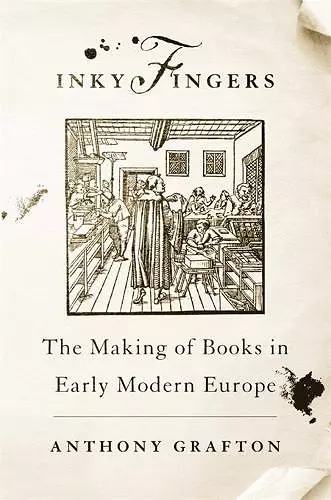Inky Fingers
The Making of Books in Early Modern Europe
Format:Paperback
Publisher:Harvard University Press
Published:27th May '22
Should be back in stock very soon

An Open Letters Review Best Book of the Year
“Grafton presents largely unfamiliar material…in a clear, even breezy style…Erudite.”
—Michael Dirda, Washington Post
In this celebration of bookmaking in all its messy and intricate detail, Anthony Grafton captures both the physical and mental labors that went into the golden age of the book—compiling notebooks, copying and correcting proofs, preparing copy—and shows us how scribes and scholars shaped influential treatises and forgeries.
Inky Fingers ranges widely, from the theological polemics of the early days of printing to the pathbreaking works of Jean Mabillon and Baruch Spinoza. Grafton draws new connections between humanistic traditions and intellectual innovations, textual learning and the delicate, arduous, error-riddled craft of making books. Through it all, he reminds us that the life of the mind depends on the work of the hands, and the nitty gritty labor of printmakers has had a profound impact on the history of ideas.
“Describes magnificent achievements, storms of controversy, and sometimes the pure devilment of scholars and printers…Captivating and often amusing.”
—Wall Street Journal
“Ideas, in this vivid telling, emerge not just from minds but from hands, not to mention the biceps that crank a press or heft a ream of paper.”
—New York Review of Books
“Grafton upends idealized understandings of early modern scholarship and blurs distinctions between the physical and mental labor that made the remarkable works of this period possible.”
—Christine Jacobson, Book Post
“Scholarship is a kind of heroism in Grafton’s account, his nine protagonists’ aching backs and tired eyes evidence of their valiant dedication to the pursuit of knowledge.”
—London Review of Books
Grafton describes magnificent achievements, storms of controversy, and sometimes the pure devilment of scholars and printers, from the 15th to the early 17th centuries…Captivating and often amusing. * Wall Street Journal *
The essays…repopulate the world of high scholarship with participants of all social ranks, dragging the most rarefied ideas down to earth…For all his own intellectual daring, Grafton’s sympathies lie with gruntwork. Originality is upstaged by transmission, inspiration by logistics. Ideas, in this vivid telling, emerge not just from minds but from hands, not to mention the biceps that crank a press or heft a ream of paper. -- Leah Price * New York Review of Books *
As usual, Grafton presents largely unfamiliar material—his last essay looks at precursors to Spinoza’s rationalist approach to biblical interpretation—in a clear, even breezy style…Erudite. -- Michael Dirda * Washington Post *
Describes the texture of intellectual life from the Renaissance to the Enlightenment…Scholarship is a kind of heroism in Grafton’s account, his nine protagonists’ aching backs and tired eyes evidence of their valiant dedication to the pursuit of knowledge. -- Erin Maglaque * London Review of Books *
Excellent and endlessly readable. -- Robert Fredona * Business History Review *
Delightful…Weave[s] together an impressive range of case studies that investigate the labors of scholarly authors between 1500 and 1750. -- Arthur der Weduwen * Library & Information History *
I can only gesture here to the richness of Grafton’s work…Looking at humanists in their world, Grafton shows once more that despite the ongoing challenges to the humanities, he is a worthy successor to those he writes about and an exemplar for those of us fortunate enough to know him or to read him. -- Jonathan Locke Hart * Renaissance and Reformation *
A new book by Grafton is always a cause for celebration. * Choice *
Grafton’s sweeping erudition and meticulous scholarship are on display in Inky Fingers, which offers us a look over the shoulders of theologians and humanist scholars. His case studies illuminate how ‘traditional’ historical skills—the careful reading of texts, the deciphering of marginalia, and the tracing of arcane references—still hold countless possibilities for new readings and revelations. -- Daniel Jütte, author of The Strait Gate: Thresholds and Power in Western History
Inky Fingers directs our attention to the inky realities of book production and the messiness of everyday life. To erase urban contexts, correspondence networks, financial burdens, and other human factors from the early modern narrative, Grafton shows us, is to distort how new ideas—both famous and obscure—came into being. An excellent and thought-provoking book! -- Ada Palmer, author of Reading Lucretius in the Renaissance and the Terra Ignota series
ISBN: 9780674271210
Dimensions: unknown
Weight: unknown
392 pages